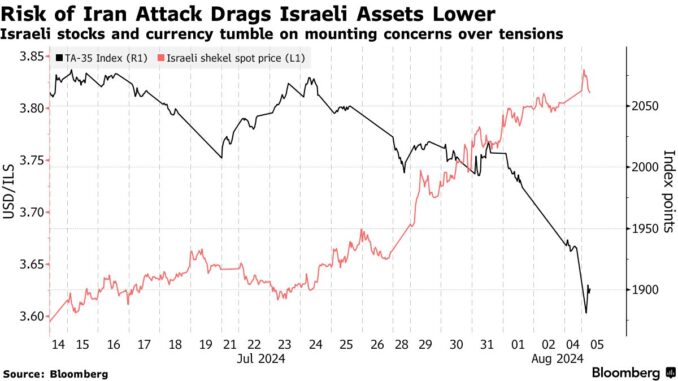
- Israeli markets drop; US sees Iranian attack in 24-48 hours
- Saudi, Egyptian, Turkish stocks, bonds, currencies also hurt
Financial markets across the Middle East tumbled Monday, as concerns over a potential Iranian attack on Israel added to bearish sentiment spawned by the ongoing global equity rout.
Israel’s equity benchmark, the TA-35 Index, slid as much as 3.1%, to trade at the lowest since February, extending last week’s 3.3% slide — the biggest weekly loss since last October. The shekel fell as much as 1% against the dollar to trade nearly at a nine-month low, while its $3 billion eurobond maturing 2023 was quoted lower.
The latest losses were sparked in part by an Axios report that US Secretary of State Antony Blinken had told his G-7 counterparts that Iran and its ally Hezbollah could attack as early as Monday. Citing three unidentified sources briefed on the call, Axios said Blinken saw the attacks starting in the next 24 to 48 hours.
However, regional markets were also feeling the heat from a global selloff that’s been fueled by signs of a worse-than-expected US economic slowdown. The growth concerns also weighed on oil prices, sending crude futures to a seven-month low.
The Saudi Tadawul Index and Egypt’s Hermes benchmark shed as much as 3.7% and 5.8% respectively. Turkey’s Borsa Istanbul 100 Index was the hardest hit, sliding more than 7% at one point.
Regional stocks pared some falls after Iran vowed to punish Israel for the assassinations of Hezbollah and Hamas officials but said wants to avoid all out war. Meanwhile, the US is pressing Israel to redouble negotiations for a Gaza cease-fire to prevent the nearly 10-month-long war from escalating.
Hasnain Malik, head of equity strategy research at Tellimer, downplayed the risk of a global or even region-wide impact, noting that major oil-producing and tourism facilities in the Middle East are distant from the conflict zones of Israel and Lebanon.
“There has been an exchange of air attacks with Iran directly, albeit these have been very targeted or very well telegraphed,” Malik said. “However, a full inter-state war with Iran would lack a clear and achievable goal.”
“There remains much greater risk to asset prices in Israel, Lebanon, and Iran, with the latter fully sanctioned for foreign investors anyway, than anywhere else in the region,” he added.
But with the conflict threatening to escalate, markets will likely remain under pressure. The shekel was down for the sixth straight day, while the Egyptian pound slid as much as 1.6% against the dollar to trade at a five-month low. Yields on Egypt’s May 2050 dollar bonds exceeded 12%, advancing for the sixth day to their highest level since February, according to data compiled by Bloomberg.
With the economic growth fears taking a toll sending crude prices to seven-month lows, Saudi Arabia’s January 2054 dollar bonds fell for the first time in seven days.
— With assistance from Selcuk Gokoluk






